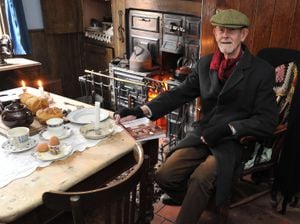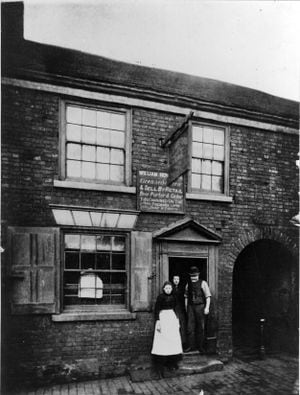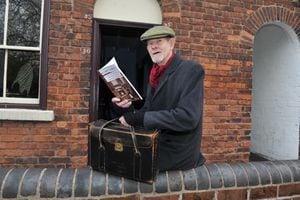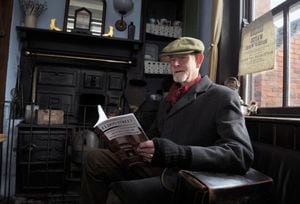Author’s snapshot of life on one Victorian street
Life was hard for working class families in Victorian Britain and desperate housing conditions, poor hygiene and long working hours left many in the Black Country struggling to survive.

Historian Keith Robinson wanted to tell the story of the struggles and heartbreak that people in Darlaston faced during the era through the experiences of residents living on a single street.
He picked Eldon Street where his great, great grandfather George Robinson and his family lived for around 15 years from the 1870s to the 1890s.
Mr Robinson says the terraced street, which no longer exists today after being demolished in the late 1960s, was typical of Darlaston during the period.
His insightful research which covers all facets of life features in his new book Eldon Street: The history of Victorian Darlaston and the Black Country.
"It's not a book about buildings or the great and the good of Darlaston, it's about the ordinary, working men, women and children of Darlaston who made it the place it was," says the Black Country Living Museum volunteer.

He discovered the names of about a thousand of the people who lived on Eldon Street in the Victorian age and more than 400 of these are referenced in his book.
Census records, old newspapers, parliamentary reports and trade directories were among the sources of information used to paint a picture of what life would have been like for them at the time.
Retired history teacher Mr Robinson was able to see what industries workers were employed in and how that changed over the period with gunlock production making way for nuts and bolts.
"There were 100 different trades on Eldon Street during the Victorian period. During the first half of the century, the trade that dominated was gun lock filing. A lot of Eldon Street people had their won workshops or they worked in someone else's workshop.
"Gunlock forging and filing was all done by hand. By the middle of the century it started to change and the Government set up a factory in Enfield that used machinery.

"A recruiter from Enfield came to Darlaston and recruited 30 people to work at the factory including a few from Eldon Street who all lived on the same street in Enfield.
"By the end of the century 66 people from Eldon Street were engaged in nuts and bolts work - that's probably 30 to 40 per cent of the working population working in nuts and bolts. Darlaston had become the nuts and bolts capital of the world," says Mr Robinson, who grew up in Wednesbury and now lives in Shrewsbury.
Public health records shed light on what living conditions were like for families and it made for grim reading.
"About half of the houses in the street had defective privies so the conditions were far from clean. Two children in Eldon Street died drinking water that had been contaminated by a neighbour's leaking privy.
"The rate book of 1893 showed who owned the houses and 50 of the 66 houses in Eldon Street were in the hands of nine people," said Mr Robinson.
The residents of Eldon Street worked hard but they also played hard. Records show that at one time there were eight drinking establishments including three pubs. The rest were beer houses where people used their front room to sell alcohol.

But this meant crime fuelled by drink was rife in Eldon Street. "People drank and there were fights. I found four or five manslaughter cases involving people from Eldon Street. It was always manslaughter, not murder, because they took into consideration their drinking.
"My take on it is that people were working that hard and living in such terrible conditions that they couldn't live with the reality of their lives. They went to the pub and blotted it out," says Mr Robinson.
He also uncovered the hobbies of the residents which including boxing, cock-fighting, bell-ringing and rabbit breeding.
Dog fighting was also popular and he discovered that animals were treated well by their owners.
"There was a court case where a woman complained that her husband spent more on his dogs than he did on looking after the family," says Mr Robinson.
During his research he discovered that as well as there being a high infant mortality rate in the town at the time, there was also a high adult death rate and as a result there were many blended families.

"It happened a lot that two families would come together to try to survive because if you were a father who had lost his wife, he couldn't look after the children and go to work so it made sense.
"I found 20 cases of this in Eldon Street which surprised me," says Mr Robinson who has also written the book Iron, Coal & Roses which follows one family’s rise and fall in the iron industry in Moxley, Darlaston, Wednesbury, Bilston and Old Hill.
His Eldon Street book contains a reference list of the 400 people whose experiences he has featured which he hopes will help anyone who wants to trace relatives who lived there.
"I achieved what I set out to do and tell the story of Victorian Darlaston through the lives of these ordinary people living in one street - there were the people who made Darlaston tick," says Mr Robinson.
He will be launching the book at Darlaston Library on November 21 at 2pm and at the Black Country Living Museum, where he will be signing copies, on November 23 from 10am.
It is available, priced £9.99 from Darlaston Library, the Black Country Living Museum, Ashwood Nurseries, near Kingswinford, and from Mr Robinson at netcord9@hotmail.com or 07932694279





